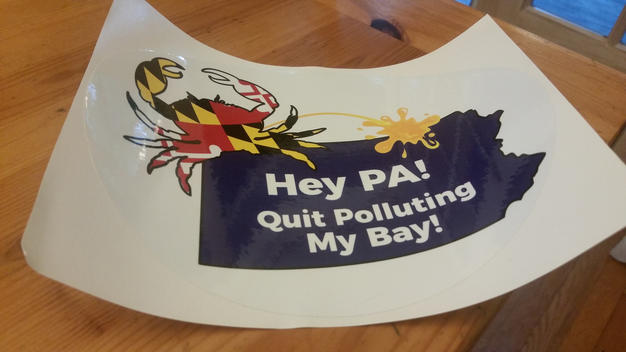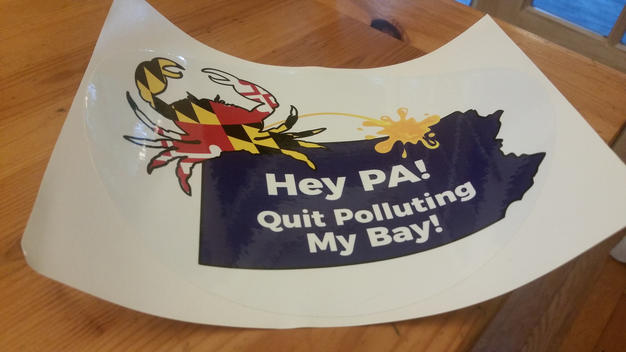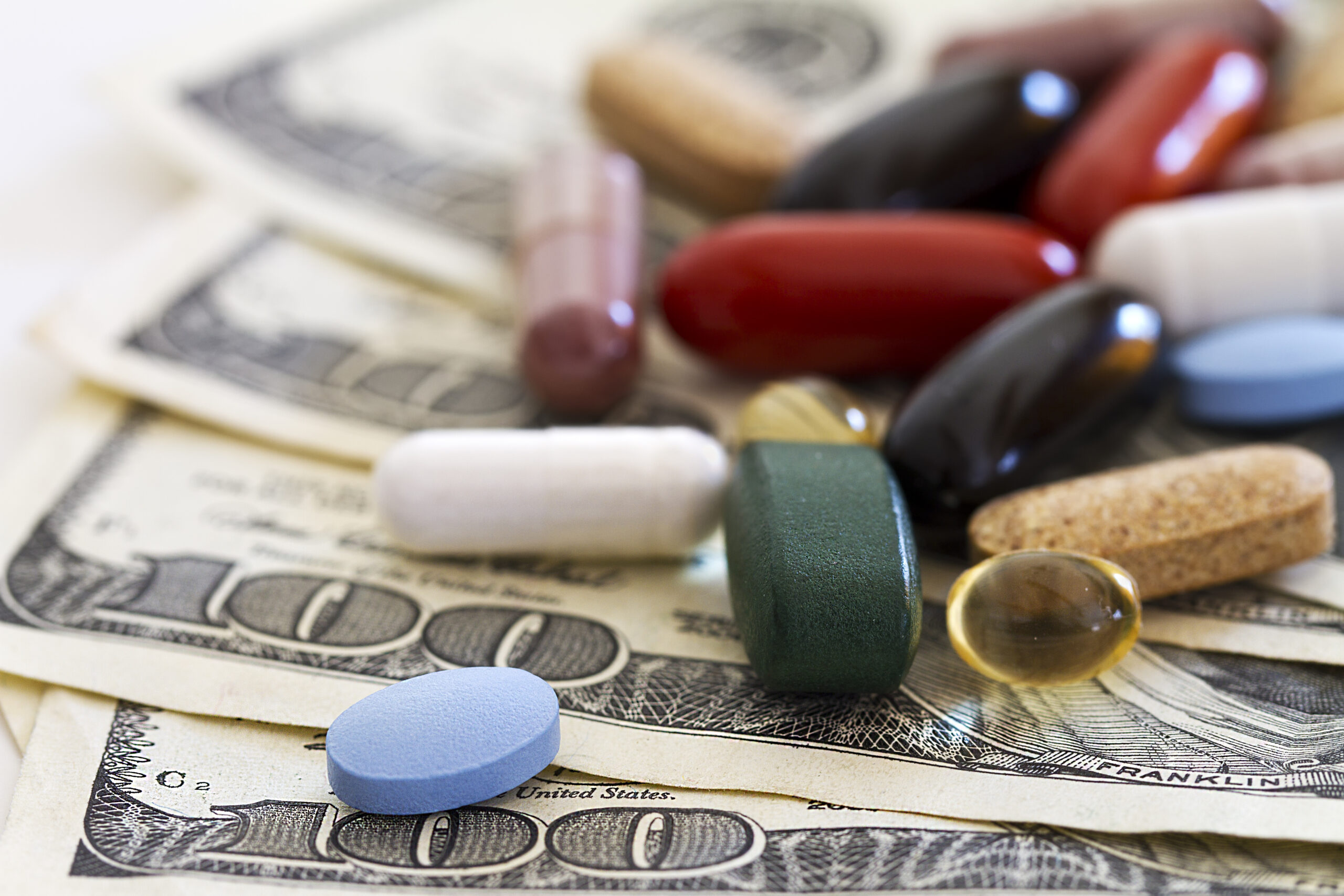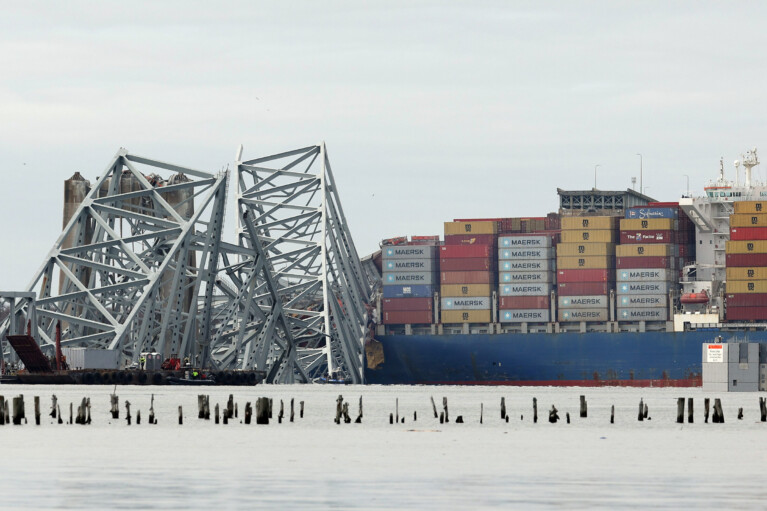Water Pollution From Pa. May Propel Economic Sanctions Legislation

A recent torrent of pollution flowing into the Chesapeake Bay from upstream in New York and Pennsylvania could give new impetus to legislation in Annapolis calling for an official Maryland economic boycott of Pennsylvania. Del. Benjamin F. Kramer (D-Montgomery), who is all but certain to be elected to the state Senate in November, used last week’s Maryland Association of Counties convention in Ocean City to promote his boycott bill, which stalled during this year’s General Assembly session but is likely to be introduced in 2019. The sediment, debris and phosphorous pouring into the bay in recent weeks from the Susquehanna River, following heavy rains and floods in Pennsylvania and New York, will almost certainly give Kramer’s bill – which specifically targeted Pennsylvania – new life.  A bumper sticker that Del. Benjamin F. Kramer is handing out as he promotes legislation seeking economic sanctions on Pennsylvania for upstream pollution flowing into the Chesapeake Bay. Photo by Josh Kurtz The measure, known informally as the Quit Polluting My Bay Act of 2018, would have limited Maryland’s ability to enter into procurement contracts with companies in states that have not been meeting U.S. Environmental Protection Agency goals for Chesapeake Bay cleanup, and would have also prevented state employees from being reimbursed for official travel to states falling short of the EPA pollution goals. Only one of the six states in the Chesapeake Bay watershed is not meeting current EPA standards: Pennsylvania. “The whole idea was, let’s show a little leadership at the state level,” Kramer told a meeting of the Clean Chesapeake Coalition, a group of government officials from six rural Maryland counties that border the bay. “It’s Pennsylvania’s toilet bowl and until we get their attention, I don’t think we’re going to see improvements and changes from our neighbors to the north.” As he pushed his legislation earlier this year, Kramer handed out humorous bumper stickers showing a Maryland crab urinating on Pennsylvania, with the words, “Hey PA! Quit Polluting My Bay!” As he renews his campaign, Kramer has made up bigger bumper stickers, and he happily gave them out throughout the MACo conference. The officials from these rural counties are in universal agreement that Pennsylvania is the No. 1 culprit when it comes to bay pollution, which flows from the Susquehanna and spills over the Conowingo Dam and into the Chesapeake. But some expressed fears that directly targeting Pennsylvania could have economic consequences for Maryland. Caroline County Commissioner Wilbur Levengood Jr. (R) noted that most grain grown in Maryland is shipped to Pennsylvania to be milled. “We’re talking about trade wars here,” he said. That very issue may derail Kramer’s bill. House Environment and Transportation Chairman Kumar P. Barve (D-Montgomery) last week described Kramer’s legislation as “a semi-comical bill” that is likely unconstitutional because it would violate interstate commerce laws. When it comes to enforcing pollution laws that impact the Chesapeake Bay, “there’s really no substitute for a strong EPA,” he said. But EPA’s commitment to the health of the bay under the Trump administration has been called into question. While Andrew R. Wheeler, EPA’s acting administrator, did attend a meeting of the Chesapeake Bay Executive Council in Baltimore earlier this month, the Trump administration proposed zeroing out all Chesapeake Bay cleanup funds in its fiscal 2019 budget. All 10 members of Maryland’s congressional delegation succeeded in restoring the $73 million in annual funding. “It was not controversial at all,” said U.S. Sen. Benjamin L. Cardin (D), noting the consensus agreement. He added that there is a proposal in the Senate to boost the fund to $90 million. Even with the funding restored, Capitol Hill remains a threat to Chesapeake cleanup. For the past two years, the House has passed budgetary language restricting the federal government’s ability to penalize states that fall short of meeting their bay pollution goals. The Senate must go along for the provision to take effect. Several county officials in Maryland say that because only half of Pennsylvania is in the Susquehanna watershed, there is little incentive for farmers and other businesses there to care much about the health of the river, let alone the Chesapeake. But Maryland Environment Secretary Ben H. Grumbles said that even under the Trump administration, he expects EPA to exert influence on Pennsylvania. “EPA has a vested interest in the health of the Susquehanna,” he said. The Clean Chesapeake Coalition represents counties with agriculture and the seafood industry have been the leading employers, and some officials have resisted certain environmental rules that impact farmers and watermen, preferring instead to focus on upstream pollution and the crumbling Conowingo Dam. The coalition last week debuted a 12-minute video, “The Conowingo Factor,” that outlines the threat to the bay from upstream. Charles D. “Chip” MacLeod, general counsel for the coalition argued that major state and local investments in bay cleanup are “a fool’s errand” if pollution from the Susquehanna continues to flow downstream unabated. Leaders of the Clean Chesapeake Coalition said the group’s regular meetings have attracted a growing array of stakeholders since it launched a decade ago, and that local officials appreciate the leadership of Gov. Lawrence J. Hogan Jr.’s (R) administration on bay issues. “It just happens that the counties of the CCC and the priorities of the administration have aligned,” he said. [email protected]
A bumper sticker that Del. Benjamin F. Kramer is handing out as he promotes legislation seeking economic sanctions on Pennsylvania for upstream pollution flowing into the Chesapeake Bay. Photo by Josh Kurtz The measure, known informally as the Quit Polluting My Bay Act of 2018, would have limited Maryland’s ability to enter into procurement contracts with companies in states that have not been meeting U.S. Environmental Protection Agency goals for Chesapeake Bay cleanup, and would have also prevented state employees from being reimbursed for official travel to states falling short of the EPA pollution goals. Only one of the six states in the Chesapeake Bay watershed is not meeting current EPA standards: Pennsylvania. “The whole idea was, let’s show a little leadership at the state level,” Kramer told a meeting of the Clean Chesapeake Coalition, a group of government officials from six rural Maryland counties that border the bay. “It’s Pennsylvania’s toilet bowl and until we get their attention, I don’t think we’re going to see improvements and changes from our neighbors to the north.” As he pushed his legislation earlier this year, Kramer handed out humorous bumper stickers showing a Maryland crab urinating on Pennsylvania, with the words, “Hey PA! Quit Polluting My Bay!” As he renews his campaign, Kramer has made up bigger bumper stickers, and he happily gave them out throughout the MACo conference. The officials from these rural counties are in universal agreement that Pennsylvania is the No. 1 culprit when it comes to bay pollution, which flows from the Susquehanna and spills over the Conowingo Dam and into the Chesapeake. But some expressed fears that directly targeting Pennsylvania could have economic consequences for Maryland. Caroline County Commissioner Wilbur Levengood Jr. (R) noted that most grain grown in Maryland is shipped to Pennsylvania to be milled. “We’re talking about trade wars here,” he said. That very issue may derail Kramer’s bill. House Environment and Transportation Chairman Kumar P. Barve (D-Montgomery) last week described Kramer’s legislation as “a semi-comical bill” that is likely unconstitutional because it would violate interstate commerce laws. When it comes to enforcing pollution laws that impact the Chesapeake Bay, “there’s really no substitute for a strong EPA,” he said. But EPA’s commitment to the health of the bay under the Trump administration has been called into question. While Andrew R. Wheeler, EPA’s acting administrator, did attend a meeting of the Chesapeake Bay Executive Council in Baltimore earlier this month, the Trump administration proposed zeroing out all Chesapeake Bay cleanup funds in its fiscal 2019 budget. All 10 members of Maryland’s congressional delegation succeeded in restoring the $73 million in annual funding. “It was not controversial at all,” said U.S. Sen. Benjamin L. Cardin (D), noting the consensus agreement. He added that there is a proposal in the Senate to boost the fund to $90 million. Even with the funding restored, Capitol Hill remains a threat to Chesapeake cleanup. For the past two years, the House has passed budgetary language restricting the federal government’s ability to penalize states that fall short of meeting their bay pollution goals. The Senate must go along for the provision to take effect. Several county officials in Maryland say that because only half of Pennsylvania is in the Susquehanna watershed, there is little incentive for farmers and other businesses there to care much about the health of the river, let alone the Chesapeake. But Maryland Environment Secretary Ben H. Grumbles said that even under the Trump administration, he expects EPA to exert influence on Pennsylvania. “EPA has a vested interest in the health of the Susquehanna,” he said. The Clean Chesapeake Coalition represents counties with agriculture and the seafood industry have been the leading employers, and some officials have resisted certain environmental rules that impact farmers and watermen, preferring instead to focus on upstream pollution and the crumbling Conowingo Dam. The coalition last week debuted a 12-minute video, “The Conowingo Factor,” that outlines the threat to the bay from upstream. Charles D. “Chip” MacLeod, general counsel for the coalition argued that major state and local investments in bay cleanup are “a fool’s errand” if pollution from the Susquehanna continues to flow downstream unabated. Leaders of the Clean Chesapeake Coalition said the group’s regular meetings have attracted a growing array of stakeholders since it launched a decade ago, and that local officials appreciate the leadership of Gov. Lawrence J. Hogan Jr.’s (R) administration on bay issues. “It just happens that the counties of the CCC and the priorities of the administration have aligned,” he said. [email protected]




 Creative Commons Attribution
Creative Commons Attribution